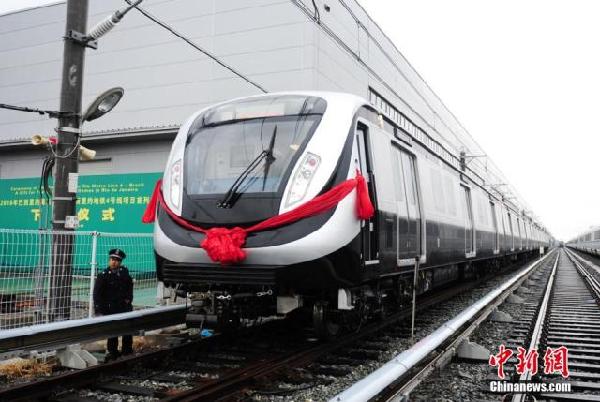International production cooperation - a new stage in China's globalization
- By John Ross
 0 Comment(s)
0 Comment(s) Print
Print E-mail China.org.cn, April 14, 2016
E-mail China.org.cn, April 14, 2016
|
|
|
China-made subway trains for the 2016 Olympic Games, developed by China CNR Corporation Limited, were put in service in Rio de Janeiro on June 10, 2015. [Photo/CNS] |
China has recently emphasized a policy of international "industrial capacity cooperation." The specific feature of this, as Gu Dawei at China's National Development and Reform Commission (NDRC) put it, is "capacity cooperation means more than export of finished products, but also the transfer of the whole industrial chain to help other countries beef up their manufacturing capability." This policy is not short term but economically rooted in China's increasing participation in the latest stage of globalization. It is particularly applicable in manufacturing and due to China's strength in global infrastructure industries such as power generation, transport and construction.
In one form of what might be termed "international production cooperation" China's companies undertake production projects in a particular host nation either by themselves or in cooperation with that country's companies; current major examples are railway construction projects to prepare Brazil's 2016 Olympic Games or infrastructure in Kazakhstan.
In an alternative and complementary variant, China's companies cooperate with another country's companies to operate in third countries. For example Chinese and French companies now cooperate in power generation projects in other markets. Why this form of international cooperation has developed, and its significance, can best be understood in terms of the overall forces driving globalization and China's position within it.
Since World War II, the fundamental forces driving globalization mean that its economic forms keep deepening and changing. Initially, globalization was primarily in trade and then developed in foreign direct investment (FDI). Now, creation of integrated global supply chains is spilling over into international production cooperation with China playing an increasing role.
The most fundamental force driving globalization is the enormous productive advantage of the division of labor operating not only domestically but also internationally. This is no new process. The opening sentence of the first chapter of the founding work of modern economics, Adam Smith's "The Wealth of Nations," already stated clearly, "The greatest improvement in the productive powers… has been the effect of the division of labor."
Modern economic statistics confirms Smith's analysis is as valid as when written more than two centuries ago. Every major factual study confirms the positive correlation between the openness of an economy to trade and the rapidity of its economic growth. Domestically increasing division of labor, reflected in what are termed "intermediate products," the inputs from one industry into another, is the most rapidly growing part of production.
Smith would recognize the process but its scale has naturally been gigantically magnified. Breznitz & Murphree's excellent study of globalization, "Run of the Red Queen," accurately describes its latest stage, stating, "In the last few decades, the world has witnessed a vast and accelerating increase in the fragmentation (also called decomposition, unbundling, or modularization) of productive activities. This means that the production of goods and services is no longer organized in vertically integrated hierarchical companies located in one country. Corporations increasingly break their activities into smaller, discrete modules and outsource or offshore them. This process of fragmentation has changed the international economic system, leading different regions to specialize in specific stages of production for particular industries." China's emphasis on "industrial capacity cooperation" relates to this process.







Go to Forum >>0 Comment(s)